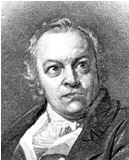Songs of Innocence and Experience by William Blake
Page 3 of 18 - 1 2 3 4 5 6 7 8 9 10 11 12 13 14 15 16 17 18 Purchase full notes for £5.95 (aprox $9.28)
And when the realisation comes that our own reasoning powers can ‘create’ a God, or, at least, distort a God, what then? If ‘All deities reside in the human breast’ ( The Marriage of Heaven and Hell ), how can we know whether we believe in the ‘right’ God – and what does such a phrase even mean? Blake does not try to answer these ‘cursed questions,’ but he does recognise, profoundly, that ‘Without contraries there is no progression’ ( The Marriage of Heaven and Hell ). There must be development from innocence to experience , if only so that one can look back upon innocence and see it clearly for what it is.
Blake’s vision of innocence, therefore, is not to be preferred to his vision of experience. Neither are entirely ‘good’ or ‘bad’ in themselves: Blake’s vision, despite appearances, is not dualistic. This is an important point, because it is so easy to be overwhelmed by the brutally realistic portrayal of evil and suffering in the Songs of Experience , and to view innocence as therefore the far preferable vision. But there can be very little doubt that Blake himself would have opposed this view, and rightly so. The point is, rather, that the vision of innocence does not see the evil around it; it needs protection from it, in fact: it must be ‘in the Garden’ or in the young Buddha’s palace and real evil must be walled off. When evil does creep in, as in The Chimney Sweeper from Songs of Innocence , the ‘easy answers’ of innocence become less and less satisfactory. Blake’s experience vision faces up to syphilis, hypocrisy, cruelty, selfishness, the suffering of the innocent: such a vision is powerful and necessary, even though it does not offer the profound comforts and joys that innocence intuits.
Those comforts and joys, equally, must not be forgotten. Blake’s message is certainly not to deny us an intuitive sense of the fundamental goodness of the world. Such a view – innocence – is also true; indeed Blake implies that it is only by the way of intuition and imagination that we can awaken ‘Love, the human form divine’ (seen always by Blake in the person of Jesus Christ) and achieve true fulfilment.
Title Page
The two figures appear to be Adam and Eve being thrust out of Paradise. They are identifiable by the leafy vines around their loins. The fire is that of the Cherub who guards the gates of Eden. Blake’s subtitle ‘Shewing the two contrary states of the human soul’ suggests that we inhabit a kind of paradise when innocent, whereas experience can feel like exclusion from that paradise. Blake would have seen the concepts of ‘Eden’ and ‘Exclusion from Eden’ as symbolic of mental states, rather than as representing actual places. One is simply a necessary contrary to the other.
Blake’s vision of innocence, therefore, is not to be preferred to his vision of experience. Neither are entirely ‘good’ or ‘bad’ in themselves: Blake’s vision, despite appearances, is not dualistic. This is an important point, because it is so easy to be overwhelmed by the brutally realistic portrayal of evil and suffering in the Songs of Experience , and to view innocence as therefore the far preferable vision. But there can be very little doubt that Blake himself would have opposed this view, and rightly so. The point is, rather, that the vision of innocence does not see the evil around it; it needs protection from it, in fact: it must be ‘in the Garden’ or in the young Buddha’s palace and real evil must be walled off. When evil does creep in, as in The Chimney Sweeper from Songs of Innocence , the ‘easy answers’ of innocence become less and less satisfactory. Blake’s experience vision faces up to syphilis, hypocrisy, cruelty, selfishness, the suffering of the innocent: such a vision is powerful and necessary, even though it does not offer the profound comforts and joys that innocence intuits.
Those comforts and joys, equally, must not be forgotten. Blake’s message is certainly not to deny us an intuitive sense of the fundamental goodness of the world. Such a view – innocence – is also true; indeed Blake implies that it is only by the way of intuition and imagination that we can awaken ‘Love, the human form divine’ (seen always by Blake in the person of Jesus Christ) and achieve true fulfilment.
Title Page
The two figures appear to be Adam and Eve being thrust out of Paradise. They are identifiable by the leafy vines around their loins. The fire is that of the Cherub who guards the gates of Eden. Blake’s subtitle ‘Shewing the two contrary states of the human soul’ suggests that we inhabit a kind of paradise when innocent, whereas experience can feel like exclusion from that paradise. Blake would have seen the concepts of ‘Eden’ and ‘Exclusion from Eden’ as symbolic of mental states, rather than as representing actual places. One is simply a necessary contrary to the other.

